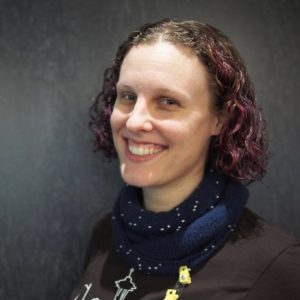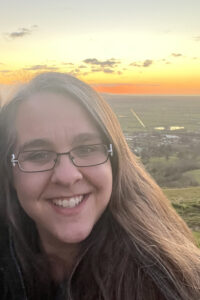In August 2025, Meredith Rawls, UW/DiRAC Research Scientist and Co-Lead of SatHub at the IAU Centre for the Protection of the Dark and Quiet Sky (CPS), and Brianna Smart, UW/DiRAC Research Scientist, attended an NSF-funded workshop on satellite constellations and Rubin Observatory at UC Davis.
The workshop resulted in a report titled, “Report on LEO satellite impacts on ground-based optical astronomy for the Rubin Observatory LSST,” which was shared on arXiv in September (v1). The report aims to minimize the impact of Starlink-like constellations on LSST science and acknowledges it cannot encompass all satellites or all observatories. Nevertheless, in addition to affirming previous recommendations, including satellite darkening mitigations, low orbital altitudes, and timely data sharing of satellite positions and trajectories, the report introduces new ones, such as coordinated de-orbit strategies, developing metrics that account for the impact of full constellations, and building a comprehensive database of satellite signatures in LSST data down to low surface brightness.
Read the report here.

Meredith Rawls 
Brianna Smart
About Meredith Rawls
Meredith Rawls is a research scientist in the Department of Astronomy and DiRAC at the University of Washington. She writes software to handle terabytes of nightly data from Vera C. Rubin Observatory’s Legacy Survey of Space and Time (LSST), which will ultimately become the highest resolution movie of the night sky ever made. She earned a BS from Harvey Mudd, a MS from San Diego State, and a PhD from New Mexico State. Her background is in stellar astrophysics, but lately she studies the plethora of newly-launched low-Earth-orbit satellites in the hopes observers worldwide don’t lose the night sky. She lives with her family in Seattle, enjoys playing viola, and primarily gets around by e-bike.
About Brianna Smart
Brianna Smart is a research scientist in the Department of Astronomy and DiRAC at the University of Washington. She writes software as part of the Alert Productions Data Management group in support of the Vera C. Rubin Observatoriy’s Legacy Survey of Space and Time. She earned her B.S. in Astronomy and Physics at the University of Arizona, and her M.S. and PhD from The University of Wisconsin. Brianna has a varied background in astronomy from exoplanets to stellar dynamics to diffuse ionized gas. She also enjoys any science topic related to the Magellanic Clouds.